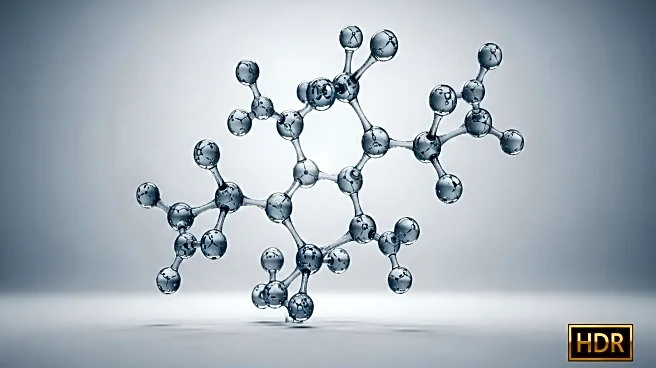What's Happening?
Northwestern University chemists have introduced a new plastic upcycling process that utilizes a nickel-based catalyst to efficiently break down polyolefin plastics, which constitute a significant portion of global plastic consumption. This innovative catalyst can transform low-value solid plastics into liquid oils and waxes, which can be upcycled into higher-value products such as lubricants, fuels, and candles. The catalyst is designed to bypass the labor-intensive sorting of mixed plastic waste, making recycling more practical and economically viable. It also demonstrates resilience against contamination from polyvinyl chloride (PVC), a polymer that typically renders plastics unrecyclable.
Why It's Important?
The development of this catalyst addresses one of the major challenges in plastic recycling: the need for meticulous sorting of plastic waste by type. By simplifying the recycling process, this catalyst could significantly increase recycling rates for polyolefin plastics, which are currently alarmingly low. This advancement has the potential to reduce the environmental impact of plastic waste, which often ends up in landfills and contributes to pollution. The ability to recycle contaminated plastics could also lead to more sustainable waste management practices, benefiting both the environment and the economy.
What's Next?
The research team plans to further explore the capabilities of the catalyst, particularly its ability to handle mixed plastic waste deemed 'unrecyclable' due to PVC contamination. The catalyst's regeneration over multiple cycles through simple treatment suggests potential for widespread industrial application. As the technology develops, it may attract interest from industries seeking more efficient and sustainable recycling solutions, potentially leading to collaborations and investments in large-scale implementation.
Beyond the Headlines
The introduction of this catalyst could trigger a shift in the recycling industry, encouraging the adoption of more advanced technologies that prioritize efficiency and sustainability. It also raises ethical considerations regarding the responsibility of industries to invest in environmentally friendly practices and the role of scientific innovation in addressing global waste challenges.









